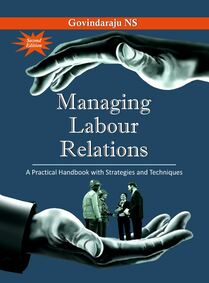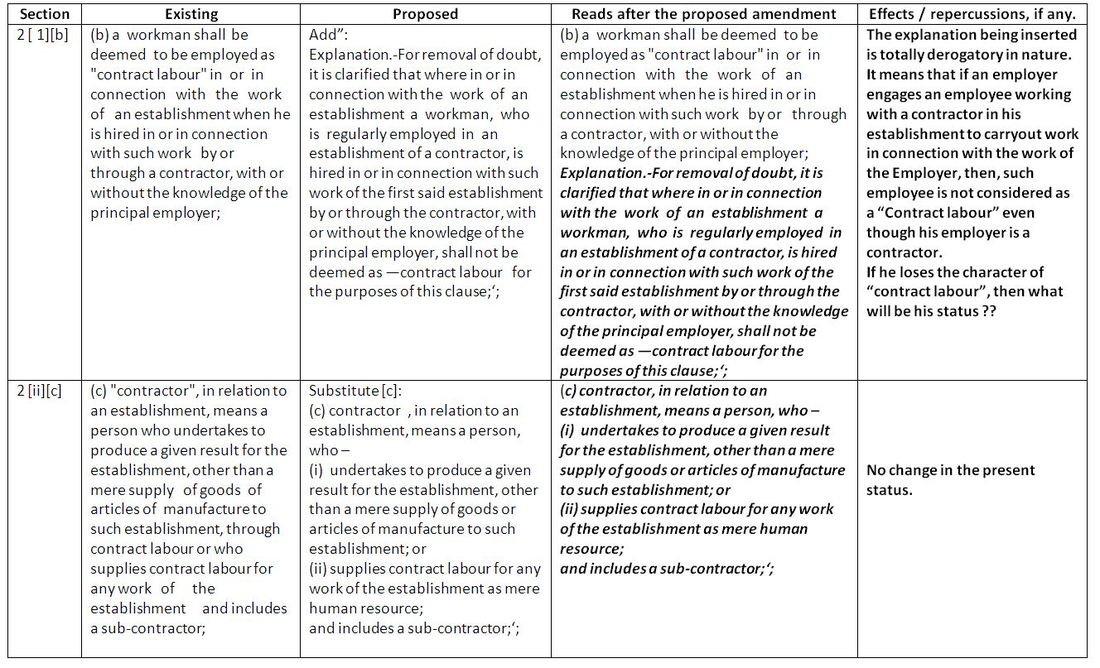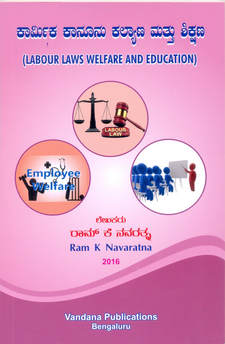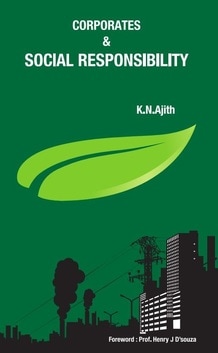|
Author : Dr. Narayanappa T.V. Pages : 688 Contents Foreword
Preface Acknowledgement PART - I THE FACTORIES ACT, 1948 1. History CHAPTER 1, PRELIMINARY 1. Short title, extent and commencement 2. Interpretation 3. References to time of day 4. Power to declare different departments to be separate factories or two or more factories to be a single factory. 5. Power to exempt during public emergency 6. Approval, licensing and registration of factories 7. Notice by occupier 7A. General duties of the occupier 7B. General duties of manufacturers, etc. as regards articles and substances for use in factories CHAPTER II, THE INSPECTING STAFF 8. Inspectors 9. Powers of Inspectors 10. Certifying surgeons
0 Comments
Contents List of Abbreviations
Preface Acknowledgements Introduction Contributing Organisations and Leaders Part 1. HR Refreshed 1.Through the Eyes of the Beholder 2.New Meanings 3.Evolving Expectations 4.The Doing, Feeling and Thinking Paradigm Part 2. Bringing People on Board 5.Planning in Uncertain Times 6.Remaining Attractive 7.Choosing Right Part 3. Managing People 8.The Spectrum of Relationships 9.Learning, the New Way 10.Beyond Managing Performance 11.Money and Beyond 12.Managing the Moments of Truth Part 4. Management and Leadership Development 13.Aspirations and Needs 14.Channelising Aspirations 15.Institutionalising the Process 16.Developing Managers and Leaders Part 5. Making the Organisation Effective 17.Leading Change 18.Designing Organisations 19.Contributing to Leadership Effectiveness 20.Shaping the Way Organisations Work Part 6. Managing the Relationship with Employees 21.Boundaries Redefined 22.What Really Matters 23.Towards Progressive Employee Relations Part 7. The Making of the Quintessential People Champion 24.Advancing in HR 25. The Young HR Professional's Readiness to Serve 26.The CEO's Schooling as a People Champion Epilogue About the Authors Contents Preface
Dear Readers, Most of the literature available on industrial relations today focus on the legal provisions and solutions based on judicial principles. The solutions and approaches based on people management, practical experience, and human behaviour are scarce. It is not that the experience and knowledge are not available. Some experts and professionals have used and tested principles and solutions based on management principles. However, the experience is not getting shared through writing as expected. One may find a few articles and blogs here and there, but it is not sufficient. An organized and committed effort is still to start on this subject. This book is a sincere effort to share the learnings with professionals, students, and the academic community. ಎಚ್.ಎನ್. ಯಾದವಾಡ ನಿವೃತ್ತ ಸಹ ನಿರ್ದೇಶಕರು, ಕಾರ್ಮಿಕ ಹಾಗೂ ಉದ್ಯೋಗ ಇಲಾಖೆ, ಭಾರತ ಸರಕಾರ ಕೈಗಾರಿಕಾ ಕ್ರಾಂತಿಯ ಪರಿಣಾಮದಿಂದಾಗಿ ಜಗತ್ತಿನಾದ್ಯಂತ ಬೃಹತ್ ಪ್ರಮಾಣದಲ್ಲಿ ಕಾರ್ಖಾನೆಗಳು ಸ್ಥಾಪನೆಗೊಂಡವು. ಕೇವಲ ಬೆರಳಿಣಿಕೆಯಷ್ಟು ಜನ ಕೆಲಸ ಮಾಡುವ ಗುಡಿ ಕೈಗಾರಿಕೆಗಳಿಗೆ ಸೀಮಿತವಾಗಿದ್ದ ಉದ್ದಿಮೆಗಳು ಸಾವಿರಾರು ಕಾರ್ಮಿಕರು ಕಾರ್ಯನಿರ್ವಹಿಸುವ ಕಾರ್ಖಾನೆಗಳಾಗಿ ಪರಿವರ್ತನೆಗೊಂಡವು. ಯಂತ್ರಗಳ ಜೊತೆಗೆ ಹಗಲಿರುಳು ದುಡಿಯುವ ಲಕ್ಷ-ಲಕ್ಷ ಜನರು ತಮ್ಮ ಜೀವನವನ್ನು ತಾವು ದುಡಿಯುತ್ತಿರುವ ಉದ್ದಿಮೆಗಳ ಮಾಲೀಕರಿಗಾಗಿ ಮೀಸಲಿಟ್ಟರು. ಜಗತ್ತಿನಾದ್ಯಂತ ನಡೆದ ಈ ವಿದ್ಯಮಾನ ಭಾರತಕ್ಕೂ ಹೊರತಾಗಿರಲಿಲ್ಲ. ಅನಾಯಾಸವಾಗಿ ಈಗ ಕಾರ್ಮಿಕರ ಕುಟುಂಬದ ಸಂಪೂರ್ಣ ಜವಾಬ್ದಾರಿ ಆಯಾ ಉದ್ದಿಮೆಗಳ ಆಡಳಿತ ಮಂಡಳಿಗೆ ಸೇರಿತು. ಕಾರ್ಮಿಕರು ಕಾರ್ಯನಿರ್ವಹಿಸುತ್ತಿರುವ ಸ್ಥಳಗಳಲ್ಲಿ ಗಾಯಗೊಂಡರೆ ಅಥವಾ ದುರ್ದೈವದಿಂದ ಮರಣವನ್ನಪ್ಪಿದರೆ ಆಡಳಿತ ಮಂಡಳಿ ಸ್ವಲ್ಪ ಹಣಕಾಸು ನೆರವು ನೀಡಿ ತಮ್ಮ ಜವಾಬ್ದಾರಿಯಿಂದ ಮುಕ್ತವಾಗುತ್ತಿದ್ದುದು ಸಾಮಾನ್ಯವಾಗಿತ್ತು. ಇಂತಹ ಹೃದಯ ವಿದ್ರಾವಕ ಸಾವಿರಾರು ಘಟನೆಗಳು ಸರ್ಕಾರದ ಗಮನಕ್ಕೆ ಬಂದವು. ಆಯಾ ಕುಟುಂಬದ ಸ್ಥಿತಿ ಚಿಂತಾಜನಕವಾಗುತ್ತಿರುವ ಸೂಕ್ಷ್ಮ ವಿಷಯವನ್ನು ಕೇಂದ್ರ ಬಿಂದುವಾಗಿ ಯೋಚಿಸಿದ ಸರ್ಕಾರ ಸಾವಿರಾರು ಕಾರ್ಮಿಕರು ಹಾಗೂ ಅವರ ಕುಟುಂಬದ ಅವಲಂಬಿತ ಸದಸ್ಯರುಗಳ ಹಿತರಕ್ಷಣೆಗಾಗಿ ನೌಕರರ ರಾಜ್ಯ ವಿಮಾ ನಿಗಮ ಎಂಬ ಸಾಮಾಜಿಕ ಸುರಕ್ಷಾ ಯೋಜನೆಯೊಂದನ್ನು ಜಾರಿಗೆ ತರಲಾಯಿತು. ಸ್ವತಂತ್ರ ಭಾರತದ ಮೊಟ್ಟ ಮೊದಲ ಅಧಿನಿಯಮ 1948 ಲೋಕಸಭೆಯಲ್ಲಿ ಬಹುಮತದಿಂದ ಜಾರಿಯಾಗಿದುದಕ್ಕೆ ಇತಿಹಾಸ ಸಾಕ್ಷಿಯಾಯಿತು.
ಎಸ್.ವಿ. ಮಂಜುನಾಥ್ ಸಹನಿರ್ದೇಶಕರು, ಅಜೀ಼ಮ್ ಪ್ರೇಮ್ಜಿ ವಿಶ್ವವಿದ್ಯಾಲಯ, ಕರ್ನಾಟಕ ಕಾರ್ಮಿಕ ಸಂಘಗಳೊಂದಿಗಿನ ನನ್ನ ಒಡನಾಟವು ನನ್ನ ವೃತ್ತಿಜೀವನದಲ್ಲಿ ಅತ್ಯಂತ ಪ್ರಮುಖ ಭಾಗವಾಗಿದ್ದು ನೇರವಾಗಿ ನಾನು ಪಡೆದ ಅನುಭವಗಳ ಹಲವಾರು ಮಜಲುಗಳನ್ನು ಇಲ್ಲಿ ತೆರೆದಿಡುವ ಪ್ರಯತ್ನ ನನ್ನದು.
ನನ್ನ ಅನುಭವಗಳನ್ನು ಹಂಚಿಕೊಳ್ಳುವ ಮುನ್ನ ಕಾರ್ಮಿಕ ಸಂಘಗಳು ಕೈಗಾರಿಕೆಗಳಲ್ಲಿ ಯಾವ ಸಾಂದರ್ಭಿಕ ಹಿನ್ನೆಲೆಯಲ್ಲಿ ಪ್ರಸ್ತುತ ಕಾರ್ಯಪ್ರವೃತ್ತವಾಗಿವೆ ಎಂಬುದನ್ನು ಅರಿಯುವುದು ಅಗತ್ಯವಾಗಿದೆ. ಕಾರ್ಮಿಕ ಸಂಘಗಳ ಕಾರ್ಯನಿರ್ವಹಣೆಯ ಸಾಂದರ್ಭಿಕ ಹಿನ್ನೆಲೆ - ಕಳೆದ ಎರಡು ದಶಕಗಳ ಹಿನ್ನೋಟ : ನನ್ನ ವೃತ್ತಿ ಜೀವನದ ಪ್ರಾರಂಭದ ಅವಧಿ (1990) ಹಾಗೂ ಅದರ ಸುತ್ತಮುತ್ತಲಿನ ಕಾಲಾವಧಿಯಲ್ಲಿಯೇ ವಿಶ್ವದ ರಾಜಕೀಯ, ಆರ್ಥಿಕ ಮತ್ತು ಸಾಮಾಜಿಕ ರಂಗಗಳಲ್ಲಿ ಪ್ರಮುಖ ಬದಲಾವಣೆಗಳಾದವು. K.Vittala Rao Management Consultant
ಲೇಖಕರ ಮಾತು
ಮಾನವ ಸಂಪನ್ಮೂಲ ನಿರ್ವಹಣಾ ಕ್ಷೇತ್ರಕ್ಕೆ ಸಂಬಂಧಿಸಿದಂತೆ ಕನ್ನಡದಲ್ಲಿ ಹೊರಬಂದಿರುವ ಪುಸ್ತಕಗಳು ವಿರಳ. ಅದರಲ್ಲೂ ವೃತ್ತಿಯಲ್ಲಿದ್ದುಕೊಂಡು ಅದರಿಂದ ಪಡೆದ ಅನುಭವಗಳನ್ನಾಧರಿಸಿದ ಹೊತ್ತಿಗೆಗಳು ಅಷ್ಟಾಗಿ ಹೊರಬಂದಿಲ್ಲ. `ಜನಸಂಪದ' ಈ ಕೊರತೆಯನ್ನು ಸ್ವಲ್ಪಮಟ್ಟಿಗಾದರೂ ನಿವಾರಿಸುತ್ತದೆಂಬುದು ನನ್ನ ಪ್ರಾಮಾಣಿಕ ಅನಿಸಿಕೆಯಾಗಿದೆ. Modern economy while making employment law compliance much simple brought implementation in strict and methodical sense. Now it is felt need by many industries that adhering to local conditions and law is really enhancing their business image and creating competitive edge. This has necessitated a display and follow applicable laws which are mandatory requirements. Due to the educational level and awareness by workforce about their rights, need has arisen to comply the provisions for cordial and right relations. Hence abstracts of laws in vernacular language come into prominence in addition to the legal requirements.
ಕಾಲ ಬದಲಾದಂತೆ ನಾವೆಲ್ಲರೂ ಬದಲಾಗಬೇಕು ಬದಲಾವಣೆ ನಿಶ್ಚಿತ ಅದರೊಂದಿಗೆ ನಾವು ಹೋದಾಗ ನಮ್ಮ ಅಭಿವೃದ್ಧಿ ಸಾಧ್ಯ, ಇಂದು ಎಲ್ಲ ಕ್ಷೇತ್ರಗಳಲ್ಲಿ ಅನೇಕಾನೇಕ ರೀತಿಯ ಬದಲಾವಣೆ ಅಭಿವೃದ್ಧಿ ಕಾಣುತ್ತಿದ್ದೇವೆ, ಆಧುನಿಕ ಸಲಕರಣೆ, ವಿಧಿ ವಿಧಾನಗಳಾದ, ಮಾಧ್ಯಮ, ಮಾಹಿತಿ ತಂತ್ರಜ್ಞಾನ, ಮಿಂಚಂಚೆ (E-mail) ಗಳಿದ್ದರೂ ಇದು ಕರ್ನಾಟಕದ ತಾಲ್ಲೂಕು, ಹಿಂದುಳಿದ ಹಾಗೂ ದುರ್ಗಮ ಪ್ರದೇಶಗಳ ಜನರಿಗೆ ಅನೇಕ ವಿಷಯಗಳು ತಲುಪಿಲ್ಲ. ಇಂದಿನ ಹೊಸ ಸರ್ಕಾರಗಳು Make in India, ಆಮ್ ಆದ್ಮಿ ಯೋಜನೆ, ಜನ್ ಧನಗಳಂತಹ ವಿಷಯಗಳು ಸಾಮಾನ್ಯರಲ್ಲಿ ಸಾಮಾನ್ಯನಿಗೆ ತಲ್ಪಿಸುವ ದಿಶೆಯಲ್ಲಿ ಪ್ರಯತ್ನ ನಡೆದುದು ಸ್ತುತ್ಯಾರ್ಹ.
ಮುನ್ನುಡಿ ಅನೇಕ ವರ್ಷಗಳಿಂದ ನನ್ನ ಮನದಾಳದಲ್ಲಿ ಆಂತರಿಕ ವಿಚಾರಣೆಯ ಬಗ್ಗೆ ಒಂದು ಕಿರು ಹೊತ್ತಿಗೆ ತರುವ ವಿಚಾರ ಇದ್ದರೂ ಅದು ಮೊಳೆತದ್ದು ಈಗ. ಇತ್ತೀಚಿಗಂತೂ ಅನೇಕ ನೌಕರರು, ಸಂಸ್ಥೆಗಳು ನನ್ನನ್ನು ಸಂಪರ್ಕಿಸಿ ಈ ವಿಷಯದಲ್ಲಿ ಸಲಹೆ, ಸೂಚನೆ ಹಾಗೂ ತರ್ಜುಮೆಗಳಿಗೆ ಕೇಳುತ್ತಿದ್ದು ಇದರ ಬಗ್ಗೆ ಚಿಕ್ಕ ಕೃತಿ ಹೊರತರಲೇಬೇಕೆಂದು ಪಣತೊಟ್ಟು ಹನ್ನೆರಡು ತಿಂಗಳಿನಿಂದ ಕಾರ್ಯೋನ್ಮುಖನಾಗಿ ಈ ಕೃತಿಯನ್ನು ತಂದಿದ್ದೇನೆ.
K.N. Ajith, pp. 144, Eeswaar Books Corporate dominance of global trade is neither new nor recent. Students of India’s history know that the East India Company was indeed a global trading corporation, chartered in December 1600 by Queen Elizabeth I to expand colonial markets. The Company quickly established military and administrative control over territories in India to dominate trade, especially in opium, tea, cotton, silk, and spices. In fact, English imperialism in India began as a form of corporate colonialism that lasted for 100 years following the East India Company’s victory in the Battle of Plassey in 1757. The Government of India Act of 1858 established the British Raj as the English monarchy’s surrogate to control colonial trade across the Indian subcontinent.
|
RAMESHA NIRATANKACategories
All
Nirathanka Citizens Connect50,000 HR PROFESSIONALS ARE CONNECTED THROUGH OUR NIRATHANKA HR GROUPS.
YOU CAN ALSO JOIN AND PARTICIPATE IN OUR GROUP DISCUSSIONS. |
||||||






















 RSS Feed
RSS Feed




